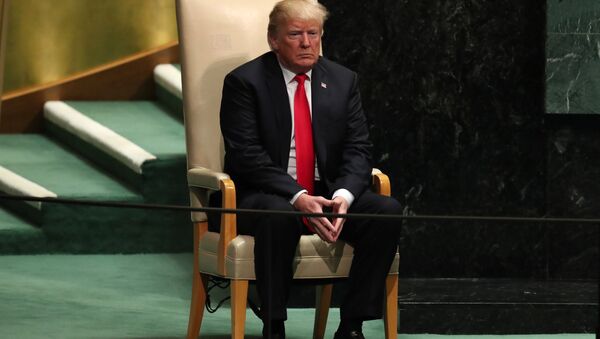German Foreign Minister Heiko Maas has refuted Donald Trump’s claims about Germany’s energy dependence on Russia. His “arguments and facts proving them, don’t correspond to the reality. There’s no German dependence on Russia; this is especially a factor in the energy field,” he said, commenting on the position voiced by the US President.
Earlier Maas also took to Twitter to brand Donald Trump’s “America First” approach the “wrong” path to solving international problems.
“America first” is the wrong answer to the problems of our time, and also the wrong answer for America. Globalization, digitalization and climate change know no borders. We can eliminate these challenges only together with international efforts,” he tweeted.
„America first“ ist die falsche Antwort auf die Probleme unserer Zeit — und auch die falsche Antwort für Amerika. Die Globalisierung, die Digitalisierung und der Klimawandel kennen keine Grenzen. Diese Herausforderungen können wir nur international und gemeinsam bewältigen.
— Heiko Maas (@HeikoMaas) 27 сентября 2018 г.
This publication followed Donald Trump’s speech at the UN General Assembly, where he took one more chance to target German leadership for pursuing the Russian-European Nord Stream 2 project to construct a gas pipeline under the Baltic Sea from Russia to Germany. He claimed that Berlin would be taken hostage by Moscow in this case.
“Germany will become totally dependent on Russian energy if it does not immediately change course,” Trump said.
As Trump was dismantling Berlin’s “grim” fate, the German delegation, headed by Heiko Maas, was spotted chuckling, “snickering” and “laughing” as some reporters noted.
However, his weren't the only laughs Trump got during his address. The audience was heard chuckling when the US President boasted that "In less than two years, my administration has accomplished almost more than any other administration in the history of our country." However, he reacted immediately with "Didn't expect that reaction, but that's OK."
In the last two years since Donald Trump moved into the White House, relations between Europe's leading economy Germany and its longstanding military and economic partner the US have witnessed uneasy times. The countries clash on major international matters, such as the US pulling out of the Iran nuclear deal, the Paris climate agreement and Trump’s decision to move the US Embassy to Jerusalem, which incited the ire of Palestinians as well as other Arab and Muslim nations.
Apart from the verbal disagreement over Nord Stream 2, in 2018 Trump, who repeatedly denounced Germany for unfair trade, imposed a 25 percent tariff on steel imports and a 10 percent tariff on aluminum imports from a number of states, including the nations of the EU, which, in turn, retaliated by slapping higher tariffs on a number of US goods. Trump has also reportedly mulled putting a 25 percent import tax on European cars – something that would particularly affect German carmakers.
READ MORE: Merkel Rebuffs Trump's Trade Deficit Claims, Citing 'Old-Fashioned' Calculations
The US President also verbally attacked Germany for not contributing enough to NATO, slamming the fact that they spend less than the agreed 2% of GDP on defense, while Germany sticks to its gradual increase in military spending.


